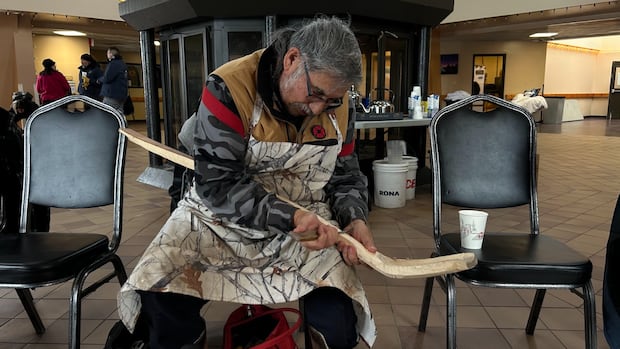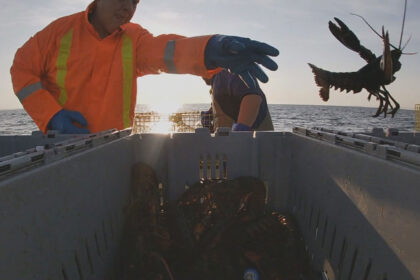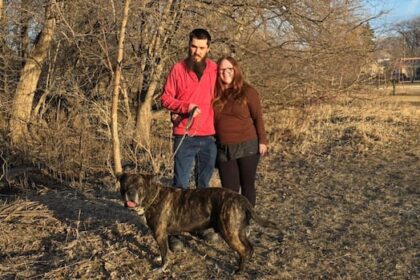NorthEvery Thursday in the heart of Chisasibi, Que., the Mitchuap fills with the comforting scent of Labrador tea, freshly-baked bannock, wood, and moose hide, as elders gather to carve, knit, and share stories. Gatherings offer a space for elders to stay connected and also teach skills rooted in the landVanna Blacksmith · CBC News · Posted: Nov 18, 2025 3:00 AM EST | Last Updated: 12 hours agoListen to this articleEstimated 5 minutesThe audio version of this article is generated by text-to-speech, a technology based on artificial intelligence.Charlie Pepabano carves a wood snow shovel at the weekly gathering at the Mitchuap in Chisasibi, Que. The Thursday get-togethers are a chance for elders to stay connected and also pass on some traditional skills and knowledge. (Vanna Blacksmith/CBC)Every Thursday in the heart of Chisasibi, Que., the Mitchuap fills with the comforting scent of Labrador tea, freshly-baked bannock, wood, and moose hide as elders gather to carve, knit, and share stories.They gather on either side of a large woodstove. Women huddle around a table as they knit, sew, and crochet — crafting mittens, warm wool socks, and moccasins. On the other side, men sit in a circle of chairs, wearing canvas aprons and gloves to protect themselves from flying wood splinters. Among them are respected bushmen like Eddie Fireman, Charlie Pepabano, and Eddie Pashagumskum. Together, they harvest wood and craft traditional tools — from shovels and gun cleaners to miniature paddles — all while passing down their knowledge of life on the land.“It’s just the social gathering of the elders. Most of us are from the residential school ages, we recall things like that or tell stories of life out on the land,” said Charlie Pepabano, who is 74 years old. Elder women sew mittens, moccasins, and wool socks, while men share tools for carving. (Vanna Blacksmith/CBC)As a residential school survivor, Pepabano says these weekly meetings are a time to reconnect with former classmates and stay in touch with each other’s lives.For Pepabano, each thing he makes at these gatherings is a way to honour those who taught him.“I watched my father, my uncles and my grandparents because they were the generation of, whatever they needed, they had to make,” he said.”They didn’t have that much access to a store, let alone the materials they needed to survive out on the land. They had to make their own.”For the community, these weekly meetings are more than a pastime; they are a living classroom where language, tradition, and identity are preserved, said Pepabano. The weekly gatherings are a living classroom where language, tradition, and identity are preserved, said one participant. (Vanna Blacksmith/CBC)“That’s how we learn anything by example and by watching other people do whatever it is they do,” said Pepabano.For Eddie Fireman, a retiree who now spends most of his life in the bush, the gatherings are a reminder of how quickly generations pass.“When I was young, I used to watch elders make these wooden shovels. As the years go by, then all the elders are mostly gone and so I decided to learn how to make these wooden shovels,” he said.Fireman explained the process of making wooden snow shovels from start to finish. “First, you gotta split it, chop it, next you gotta use your muuhkutaakin, which is a curved knife. Then, you need a sander for the final touches.” Eddie Fireman creating a miniature canoe made of birch. (Vanna Blacksmith/CBC)A project can take anywhere from one day to two weeks depending on the wood, he says — the more branches there are, the longer it takes.He says it’s important to start with the basics: how to identify trees and how to use the tools.“You gotta learn how to use your axe and your crooked knife. You also got to know the trees, which tree to use, and the name of the tree,” said Fireman.Beyond the practical skills, Fireman says traditional teachings are essential. His father taught him to care for the land, and that the land, in turn, would care for them.Eddie Peshagumskum makes wooden spoons and miniature paddles. (Vanna Blacksmith/CBC)“Don’t destroy anything like the trees that you don’t need. Only chop the ones that you need,” said Fireman.Eddie Peshagumskum, an 87-year-old elder, says he takes his role as a knowledge carrier seriously, passing down teachings just as others before him did.“Our ancestors, grandparents, fathers, all passed this on to us and we would like to pass this on further. You don’t have to be good at it, but at least you try,” said Pashagumskum.Peshagumskum welcomes anyone to come watch, ask questions, and learn the traditions. He says skill comes with repetition.“For example, like a good hockey player. When you start losing practice, you’re going to be rusty … so keep it coming back, keep on practicing,” said Pashagumskum.For Charlie Pepabano, these weekly gatherings are sometimes joined by students. Charlie Pepabano showing his handcrafted snow shovels. (Vanna Blacksmith/CBC)“The more of the younger generation we see, the better it is because the younger generations are the ones that are going that are going to have to look after this community,” said Pepabano.He hopes the lessons learned here — from carving wood to speaking Cree — help young people build resilience beyond the comforts of modern life.“An elder once told me that if there’s ever a time of a social disaster, or power outage, and you know your language and culture, you’ll still be able to keep warm and be able to eat,” said Pepabano.That message, he adds, is at the heart of why the elders return every week: to ensure their knowledge endures long after they’re gone.It’s a reminder of both responsibility and strength — one Pepabano often shares with those who come through the door.“If ever comes a time you need to be on your own, you’ll have no worries. That’s how your forefathers and ancestors survived. And look how well they managed — you’re still here because of them,” said Pepabano. ABOUT THE AUTHORVanna Blacksmith is an Eenou-Anishinaabe award winning journalist from the Cree Nation of Mistissini, works with CBC Cree in Montreal. They share stories from across Eeyou Istchee and northern Quebec, with a passion for covering sports, community, Cree culture, health, and the arts. Story ideas can be sent vanna.blacksmith@cbc.ca
Wednesday, 4 Mar 2026
Canada – The Illusion
Search
Have an existing account?
Sign In
© 2022 Foxiz News Network. Ruby Design Company. All Rights Reserved.
You May also Like
- More News:
- history
- Standing Bear Network
- John Gonzalez
- ᐊᔭᐦᑊ ayahp — It happened
- Creation
- Beneath the Water
- Olympic gold medal
- Jim Thorpe
- type O blood
- the bringer of life
- Raven
- Wás’agi
- NoiseCat
- 'Sugarcane'
- The rivers still sing
- ᑲᓂᐸᐏᐟ ᒪᐢᑿ
- ᐅᑳᐤ okâw — We remember
- ᐊᓂᓈᐯᐃᐧᐣ aninâpêwin — Truth
- This is what it means to be human.
- Nokoma










